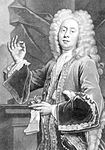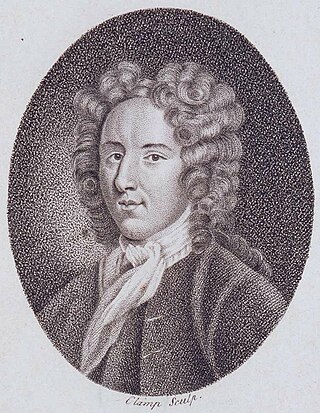
George Farquhar was an Irish dramatist. He is noted for his contributions to late Restoration comedy, particularly for his plays The Constant Couple (1699), The Recruiting Officer (1706) and The Beaux' Stratagem (1707).
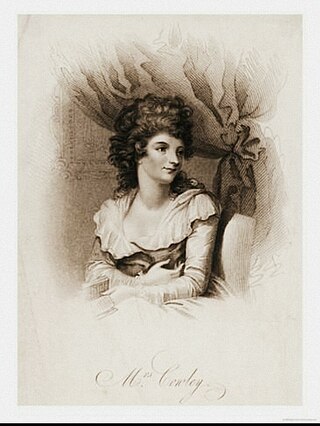
Hannah Cowley was an English playwright and poet. Although Cowley's plays and poetry did not enjoy wide popularity after the 19th century, critic Melinda Finberg rates her as "one of the foremost playwrights of the late eighteenth century" whose "skill in writing fluid, sparkling dialogue and creating sprightly, memorable comic characters compares favourably with her better-known contemporaries, Goldsmith and Sheridan." Cowley's plays were produced frequently in her lifetime. The major themes of her plays – including her first, The Runaway (1776), and her major success, which is being revived, The Belle's Stratagem (1780) – revolve around marriage and how women strive to overcome the injustices imposed by family life and social custom.
The Beaux' Stratagem is a comedy by George Farquhar, first produced at the Theatre Royal, now the site of Her Majesty's Theatre, in the Haymarket, London, on March 8, 1707. In the play, Archer and Aimwell, two young gentlemen who have fallen on hard times, plan to travel through small towns, entrap young heiresses, steal their money and move on. In the first town, Lichfield, they set their sights on Dorinda. Aimwell falls truly in love, and comedy ensues. Foigard, a priest and chaplain to the French officer, is actually an Irish priest called MacShane.

All Shook Up is a 2004 American jukebox musical with music from the Elvis Presley songbook and with a book by Joe DiPietro.
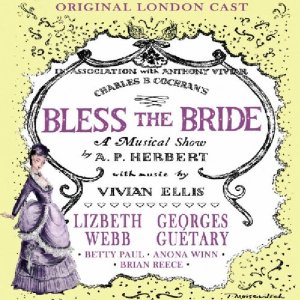
Bless the Bride is a musical with music by Vivian Ellis and a book and lyrics by A. P. Herbert, the third of five musicals they wrote together. The story is about an English girl who elopes with a debonair French actor; he goes off to serve in the Franco-Prussian War, and his friend, who bears a grudge against the English, tells his bride that he has been killed in action. The musical is remembered as Ellis's best work and for the recordings of "This is my lovely day" and "I was never kissed before", with the original stars Lizbeth Webb and Georges Guétary.
The Wedding is a Caroline era stage play, a comedy written by James Shirley. Published in 1629, it was the first of Shirley's plays to appear in print. An early comedy of manners, it is set in the fashionable world of genteel London society in Shirley's day.
The Night Walker, or The Little Thief is an early seventeenth-century stage play, a comedy written by John Fletcher and later revised by his younger contemporary James Shirley. It was first published in 1640.
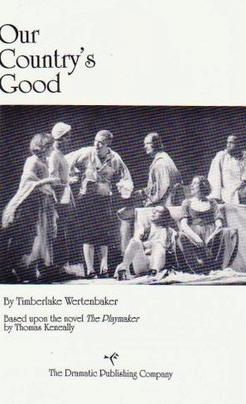
Our Country's Good is a 1988 play written by British playwright Timberlake Wertenbaker, adapted from the Thomas Keneally novel The Playmaker. The story concerns a group of Royal Marines and convicts in a penal colony in New South Wales, in the 1780s, who put on a production of The Recruiting Officer.

The Playmaker is a 1987 novel based in Australia written by the Australian author Thomas Keneally.
The Guardian is a Caroline era stage play, a comedy written by Philip Massinger, dating from 1633. "The play in which Massinger comes nearest to urbanity and suavity is The Guardian...."
The Honest Man's Fortune is a Jacobean era stage play, a tragicomedy written by Nathan Field, John Fletcher, and Philip Massinger. It was apparently the earliest of the works produced by this trio of writers, the others being The Queen of Corinth and The Knight of Malta.
The Wild Goose Chase is a late Jacobean stage play, a comedy written by John Fletcher, first performed in 1621. It is often classed among Fletcher's most effective and best-constructed plays; Edmund Gosse called it "one of the brightest and most coherent of Fletcher's comedies, a play which it is impossible to read and not be in a good humour." The drama's wit, sparkle, and urbanity anticipated and influenced the Restoration comedy of the later decades of the seventeenth century. The term "wild-goose chase" is first documented when used by Shakespeare in the early 1590s, but appears as a term with which his audience would be familiar, as there is no attempt to define its meaning.
The Devil's Law Case is a Jacobean era stage play, a tragicomedy written by John Webster, and first published in 1623.
Trumpets and Drums is an adaptation of an 18th-century English Restoration comedy by Farquhar, The Recruiting Officer. It was written by the German dramatist Bertolt Brecht in collaboration with Benno Besson and Elisabeth Hauptmann.
The English Moor, or the Mock Marriage is a Caroline era stage play, a comedy written by Richard Brome, noteworthy in its use of the stage device of blackface make-up. Registered in 1640, it was first printed in 1659, and, uniquely among the plays of Brome's canon, also survives in a manuscript version.
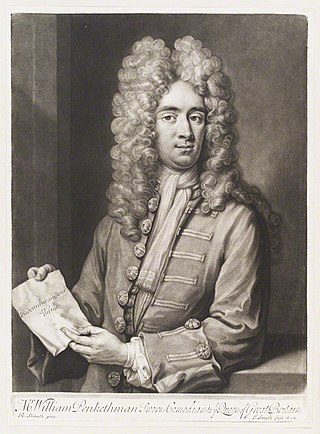
William Pinkethman was an English comic actor, a low comedian with a droll style, and theatre manager. He was considered an imitator of Anthony Leigh.

Thomas Walker (1698–1744) was an English actor and dramatist.

"The Recruiting Officer" is a 1965 Australian television production based on the famous play The Recruiting Officer, which was the first play ever performed in Australia. "The Recruiting Officer" aired on 6 January 1965 in Sydney, 13 January 1965 in Brisbane, and on 20 January 1965 in Melbourne.
Jane Rogers was an English stage actress. To distinguish her from her daughter she is sometimes referred to as Jane Rogers the Elder.
George Pack was a British stage actor, singer and theatre manager of the eighteenth century. His first known performance on the London stage was as Westmoreland in Shakespeare's Henry IV at the Lincoln's Inn Fields Theatre and he remained with the company until it transferred to the Queens's Theatre in the Haymarket in 1705. He played in a mixture of comedies and tragedies, originating roles in plays by many of the leading dramatists of the era including Nicholas Rowe, Mary Pix, John Vanbrugh and Susanna Centlivre.











